
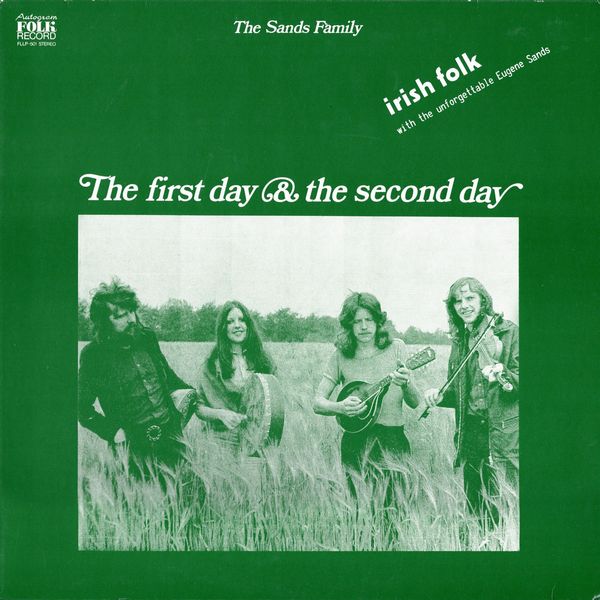 |
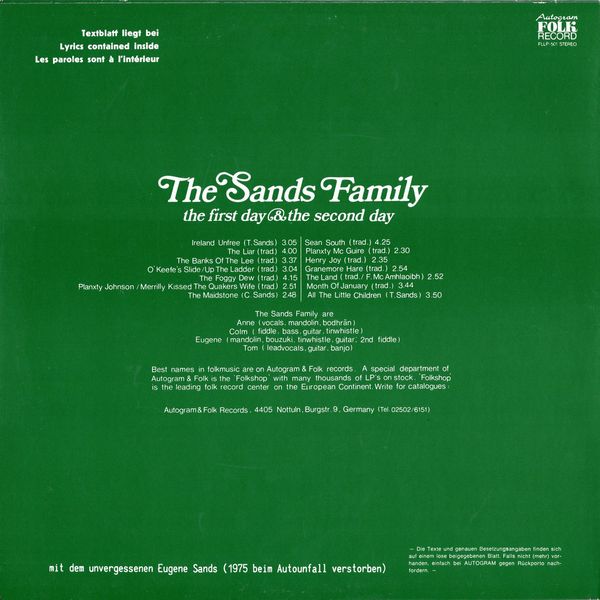
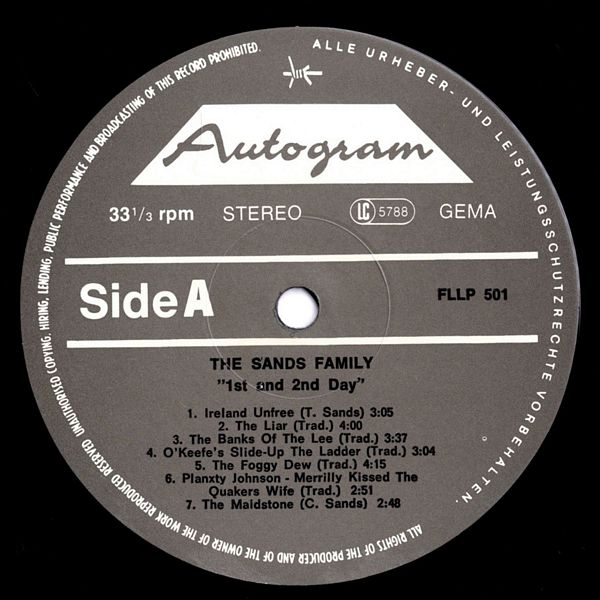
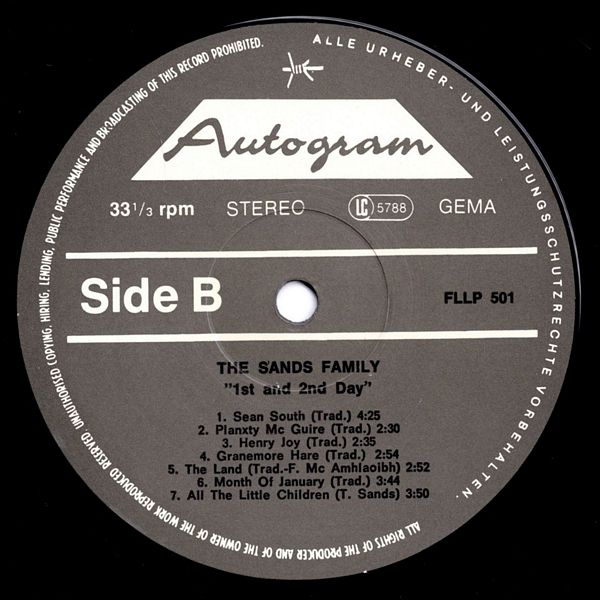 |
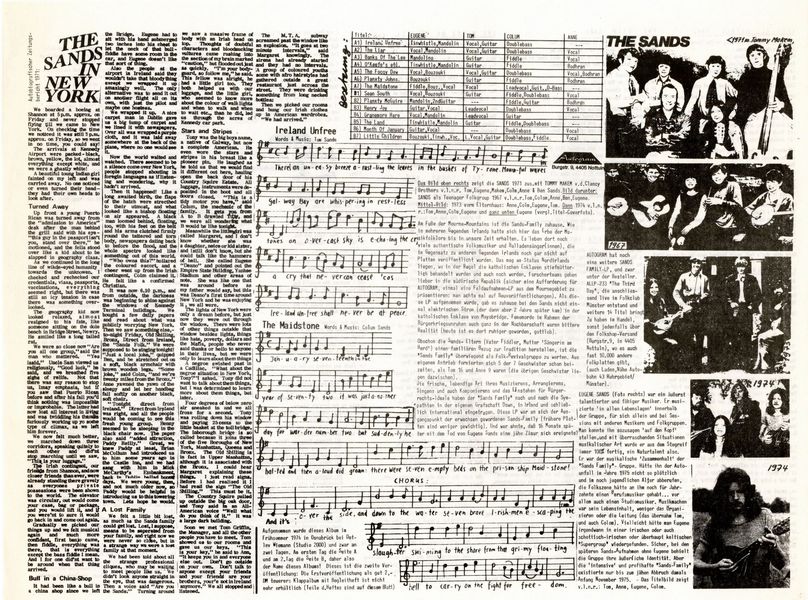
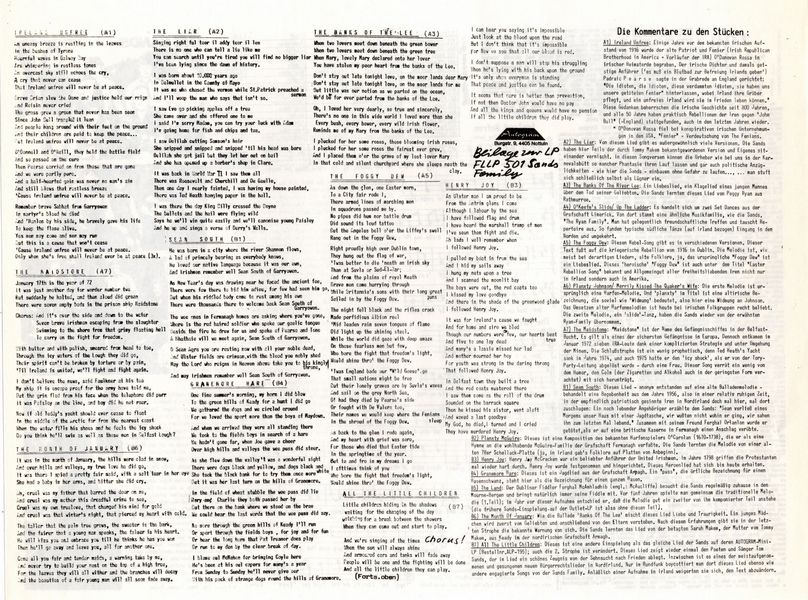
|
Sleeve Notes
The Sands family is at home at the foot of the Morne Mountains. As in several areas of Ireland, the legacy of musical folklore has survived to this day. There are still many authentic folk musicians and ballad singers living there who, unlike other areas of Ireland, have not yet been released on records. This may be due to the status of Northern Ireland, where the Catholic enclaves have generally been and continue to be neglected. Research teams prefer to go to the southern Irish Republic (certainly an invitation for AUTOGRAM to present a field recording LP from the Morne area: keep an eye out for new releases). When this LP was recorded, there wasn't even electricity back home at the Sands (which came two years later) in the Catholic enclave of Mayobridge. Femicides in the context of the civil war unrest, even in the neighborhood, were a bitter reality (today it has become quieter there, thank God).
Although the Sands parents (father fiddler, mother 'singer at the stove') establish a familial connection to tradition, the "Sands Family" can primarily be seen as a folk revival group. Of their own accord, 5 of the 7 siblings formed early on, when Tom was 16 and Anne was 9 (the other siblings are in between).
The fresh, lively way of making music, arranging, singing, composing and standing up for civil rights ideals gradually earned the "Sands Family" sympathy in their own County Down, in Ireland and finally internationally. This LP was the starting point for the Sands family as they grew up (earlier records are less important). And who knew that 16 months later a sudden turning point would occur with the death of Eugene Sands?
EUGENE SANDS was an extremely talented and accomplished musician. He played music 'in all situations' within the group, alone and in sessions with other musicians and folk groups. You could turn him 'on his head', so to speak, and he always dealt with surprising musical situations 100% straight away, so he was a natural talent. He was the musical 'cohesion' of the "Sands Family" group. If the car accident in 1975 hadn't taken him away so suddenly and at a young age, the folk scene would have had him as a professional musician for decades … especially as a studio musician. Making music was his life's purpose, rather than organizing or directing (Tom did that, and also Colom). Maybe at some point Eugene would have been found in an Irish or Scottish-Irish or even Celtic "supergroup". Certainly, in the later Sands recordings without Eugene, the group retained their external identity. But the 'intense' and professional 'Sands family' only existed until its abrupt demolition at the beginning of November 1975. — The cover photo shows from left to right: Tom, Anne, Eugene, Colom.
This album was recorded in Osnabrück in the early summer of 1974 with Detlev Hiemann (Studio 2000) over two days. On the first day side A and on the second day side B, hence the name of this album! This is the second publication: The first publication as a 2,-DH expensive folding album with accompanying booklet is no longer available (parts of the booklet are on this sheet)
The comments on the pieces:
Ireland Unfree — A few years before the well-known Irish uprising of 1916, the old patriot and Fenian (Irish Republican Brotherhood in America — forerunner of the IRA) O'Donovan Rossa was buried in Irish native soil. The Irish poet and spiritual leader of the time ('there must be a bloodbath to liberate Ireland') Padraic Pearse said in the eulogy addressed to England: 'The idiots, the idiots, these damned idiots, they left us our slain Fenians*, with Ireland tending their graves, and an unfree Ireland will never be able to live in peace.' These thoughts have dominated Irish history for 800 years, and all Irish rebellions against "John Bull" (=England) have taken place for 50 years, and again in recent years.
* O'Donovan Rossa was killed in conspiratorial Irish operations in the USA. "Fenier" = German translation of The Fenians.
The Liar — There are an extraordinary number of versions of this song. The Sands have mixed together parts of the version made famous by Tommy Makern and their own. In these song verses, the authors can let many imaginations run wild, as we did in the carnival booth, and even include political innuendo — like the Sands here — without running the risk … you end up classifying yourself as a liar.
The Banks Of The River Lee — A love song, a young man's lament for the death of his lover. The Sands learned this song from Peggy Ryan from Rathmurroe.
O'Keefe's Slide & Up The Ladder — These are two set dances from County Limerick. A similar musical family like the Sands comes from there, "The Ryan Family". They occasionally have friendly meetings and exchange repertoire. This is how typical southern dances (related to Ireland) found their way into the north and vice versa.
The Foggy Dew — This Rebel song comes in different versions. This text is based on the military rebellion of 1916 in Dublin. The melody, as is usually the case with such songs, is old folklore, yes, the original "Foggy Dew" is a love song. This 'heroic' "Foggy Dew* is also known as the "Easter Rebellion Song" and is common knowledge to all freedom-loving Irish people not only in Ireland but also in America.
Planxty Johnson & Merrily Kissed The Quaker's Wife — The first melody is originally a harp melody. And 'planxty' in the title is an old Irish term that means 'dedication', so here a dedication to Johnson. Implementing old harp melodies is now quite popular among Irish folk groups. The Sands took over the second melody, a 'slide' dance, from the aforementioned Ryan Family.
The Maidstone — "Maidstone" is the name of the prison ship in Belfast Bay. It is considered one of the safest prisons in Europe. Nevertheless, in January 1972, seven IRA men escaped thanks to a complicated strategy and bypassing the mines. The final verse is a bit prophetic, because Ted Heath's yacht sank in 1974, and he also had the 'icy shock' in 1975 when he was replaced as the Tory party leader — by a woman. This song reveals a bit of the humor that Colm (who despises cigarettes and alcohol in even the slightest form) carries with him.
Sean South — This song — written anonymously based on an old ballad melody — deals with an incident from 1956, i.e. in a relatively quiet time when sensitive, patriotic Irish people in Northern Ireland struck here and there: a still living relative told the Sands: "Sean left our house one morning with a game bag, we didn't know where he was going, it was the last time we saw him alive." He was killed along with his friend Ferghal OHanlon when they carried out an attack on a British barracks in Fermanagh.
Planxty McGuire — This is a composition by the famous harpist O'Carolan (1670-1738), which he wrote as a hymn to the wealthy McGuire family of County Fermanagh. The Sands learned the melody from an old 78 rpm shellac record (yes, in Ireland there was folk music on records from the beginning).
Henry Joy — Henry Joy McCracken was a popular leader of the United Irishmen. In 1798 the Protestants cracked down again. Henry Joy was arrested and executed. This heroic song has survived to this day.
Granemore Hare — This is a hunting song from County Armagh. A "puss", the local term for a hare's tail, is here as the name for a whole hare.
The Land — The Dublin fiddler Ferghal McAmhladhib (English: McAucliffe) regularly visits the Sands at home in the Morne Mountains and of course always brings his fiddle with him. Five years ago they played the traditional melody together (part 1); In the year before this recording he decided that the melody would be suitable for a second part composed by him (the earlier Sands recording on the outlet LP is therefore without this part).
The Month Of January — Like the ballad 'Banks Of The Lee', this song mixes love and sadness. A young girl is rejected first by her lover and then by her parents. After these experiences, she gives the well-known warning in the last verse. The Sands learned the song from the elderly Sarah Makem, mother of Tommy Makem, from Keady in County Armagh, Northern Ireland.
All The Little Children — This is a different recording than the same Sands song on their AUTOGRAM mini-LP (item no. ALP-195); the 2nd verse is also changed. This song once again features the poet and singer Tom Sands, who in the song bears beautiful witness to the longing for peace. It is now one of the most recorded and sung new civil rights songs in Northern Ireland. Only on the radio is this song boycotted there, as well as other committed songs by the Sands Family. When recording in Ireland they refused to change the lyrics.